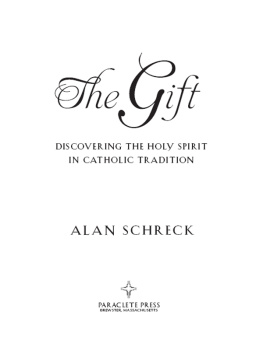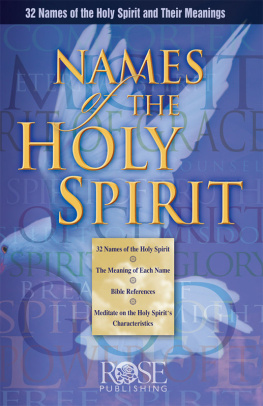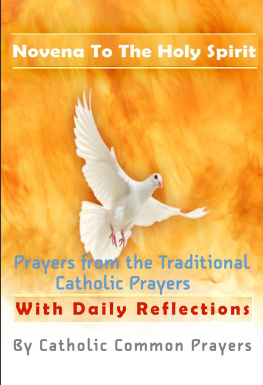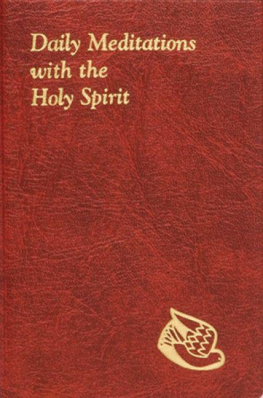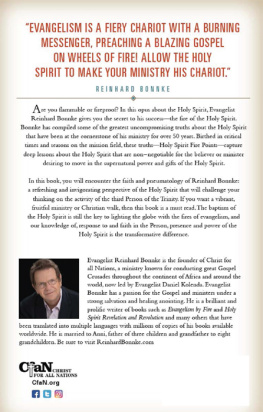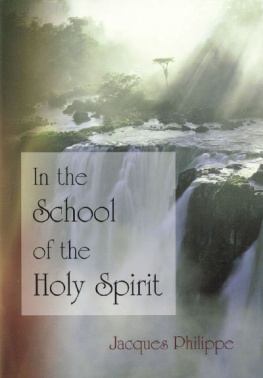
TheGift
DISCOVERING THE HOLY SPIRIT IN CATHOLIC TRADITION
TheGift
DISCOVERING THE HOLY SPIRIT IN CATHOLIC TRADITION
ALAN SCHRECK

PARACLETE PRESS
BREWSTER, MASSACHUSETTS
2013 First Printing
The Gift: Discovering the Holy Spirit in Catholic Tradition
Copyright 2013 by Alan Schreck
ISBN: 978-1-61261-166-2
Unless otherwise indicated, Scripture quotations are taken from the Catholic Edition of the Revised Standard Version of the Bible, copyright 1965, 1966 by the Division of Christian Education of the National Council of the Churches of Christ in the United States of America. Used by permission. All rights reserved.
Scriptures marked NAB are taken from the New American Bible, copyright 1970 by the confraternity of Christian Doctrine, Washington, D.C. and are used by permission of the copyright owner. No part of the New American Bible may be reproduced in any form without permission from the confraternity of Christian Doctrine, Washington, D.C.
The Paraclete Press name and logo (dove on cross) are trademarks of Paraclete Press, Inc.
Library of Congress Cataloging-in-Publication Data
Schreck, Alan.
The gift : discovering the Holy Spirit in Catholic tradition / Alan Schreck.
pages cm
Includes bibliographical references.
ISBN 978-1-61261-166-2 (trade pbk.)
1. Holy Spirit. 2. Spiritual lifeCatholic Church. 3. Catholic ChurchDoctrines.
I. Title.
BT121.3.S39 2013
231.3dc23 2013001122
10 9 8 7 6 5 4 3 2 1
All rights reserved. No portion of this book may be reproduced, stored in an electronic retrieval system, or transmitted in any form or by any meanselectronic, mechanical, photocopy, recording, or any otherexcept for brief quotations in printed reviews, without the prior permission of the publisher.
Published by Paraclete Press
Brewster, Massachusetts
www.paracletepress.com
Printed in the United States of America
To Fr. Edward OConnor, CSC,
and Fr. George Montague, SM,
who mentored me, by teaching and example,
in the ways of the Holy Spirit
CONTENTS
1.
THE PERSON OF THE HOLY SPIRIT
And for all this, nature is never spent;
There lives the dearest freshness deep down things;
And though the last lights off the black West went
Oh, morning, at the brown brink eastward, springsBecause the Holy Ghost over the bent
World broods with warm breast and with ah! bright wings
T he second stanza of Gerard Manley Hopkinss poem Gods Grandeur is an appropriate place to begin to explore the Catholic understanding of the Holy Spirit. Hopkinss image of the Holy Ghost brooding over the world is a powerful expression of the second verse of the book of Genesis (Gen. 1:2), which speaks of the spirit or breath of God hovering, like a mother bird, over the as-yet-formless
This is a fitting place for us to begin because the Catholic understanding of the Holy Spirit is essentially biblical, as is Hopkinss vision. As the Second Vatican Councils Dogmatic Constitution on Divine Revelation taught (citing Pope Leo XIII), study of the sacred page is the very soul of sacred theology. More recently, Bl. John Paul II devoted an eighty-part series of Wednesday audiences on the Holy Spirit, from April 1984 to July 1991, as well as an encyclical letter, Dominium et Vivificantem (Lord and Giver of Life), that were primarily teachings based on scriptural texts with some references to Catholic (sacred) Tradition and to theologians.
The Holy Spirit in the Old Testament
The first step, then, of a thorough study of the Catholic understanding of the Holy Spirit would be to prayerfully immerse oneself in the Sacred Scripture, beginning with the Old Testament and proceeding to the New. In doing so, we will first discover that the Hebrew words often translated spiritruah and (less frequently) neshamahliterally mean breath or wind. These words often refer to the breath that gives physical life: Then the LORD God formed man of dust from the ground, and breathed into his nostrils the breath of life; and man became a living being (Gen. 2:7). And Psalm 104 observes, If you take away their breath, they perish and return to their dust. When you send forth your spirit, they are created, and you renew the face of the earth (Ps. 104 2930, NAB). But then, the breath that creates and brings physical life becomes a metaphor for spiritual life and renewal, as in Psalm 104 and also in the prophet Ezekiels vision of the house of Israel as a mass of dry, dead bones. When, at Gods command, Ezekiel prophesies, Behold, I will cause breath to enter you, and you shall live (Ezek. 37:5), first the bones come together into bodies, and then breath came into them, and they lived, and stood upon their feet, an exceedingly great host (Ezek. 37:10). In other words, the breath or spirit of God is the source of both physical and spiritual life for humanity.
I have mentioned prophecyspeaking a word from Godwhich is also a work of the spirit or breath of God in the Old Testament. Balaam, son of Beor (Num. 24:2), Moses and the seventy elders (Num. 11:17, 2526, 29), the judges of Israel (Judg. 3:10; 4:4; 6:34; 11:29; 13:25; 14:6, 19; 15:14), and all of the prophets of Israel beginning with Samuel down to David, all received both revelation and anointing from Gods spirit. Anointing with oil (chrism) became another way the Israelites recognized the spirit of God being sent and coming to rest on a person, particularly for leadership. Samuel anointed Saul as Israels first king (1 Sam. 10:1) and later the spirit of God came mightily upon him, and he prophesied (1 Sam. 10:10). When Saul proved unworthy, the Spirit of the Lord departed from Saul, but when Samuel anointed David with the horn of oil in the midst of his brothers, the Spirit of the LORD came mightily upon David from that day forward (1 Sam. 16:1314).
Besides being a source of human and spiritual life, prophecy and powerful leadership, the breath or spirit of God later in Israels history was recognized as a source of purificationcleansing from sinand as a spirit of wisdom. God spoke through the prophet Ezekiel:
I will sprinkle clean water upon you, and you shall be clean from all your uncleanesses, and from all your idols I will cleanse you. A new heart I will give you, and a new spirit I will put within you; and I will take out of your flesh the heart of stone and give you a heart of flesh. And I will put my spirit within you, and cause you to walk in my statutes and be careful to observe my ordinances. (Ezek. 36: 2527)
The spirit of God is also described as clean water, washing away sin and enabling those who receive this spirit to keep Gods law with a new heart and a new spirit, or as Psalm 51 says, with a clean heart:
Create in me a clean heart, O God,
and put a new and right spirit within me.
Cast me not away from thy presence,
and take not thy holy Spirit from me.
Restore to me the joy of thy salvation,
and uphold me with a willing spirit. (Ps. 51:1012)
Psalm 51 is the summit of the spirituality of the psalter and a summit of the Old Testament theology of the spirit. As far as the personal and experiential dimensions of the holy spirit are concerned it will be surpassed only in the New Testament.
Despite this understanding of the Spirit as something more than a power or anointing of God in the Old Testament, it is not until later, in the Wisdom Literature, that we see wisdom (Heb.
Next page
